
If a visitor from the future were to explore the headlines of the early 21st century, certain companies would appear to totally dominate. Google, Apple and Facebook would surely be at the top of the technology heap. Yet if that visitor was a bit more astute and dug deeper, a dark horse would soon emerge.
Amazon.com is by no means the orphan of technology news coverage. But compared to the trio of big hitters, it may look like a lightweight. Even a casual dig will dispel this notion: Jeff Bezos, Amazon's founder, was hailed in 2012 by Harvard Business Review as the world's second-best CEO - just behind the late Steve Jobs. And Fortune magazine crowned him as 2012's businessperson of the year.
Leader of the pack
While hands wring over the market share in the smartphone space, some commentators have noted that Amazon can claim nearly 40% of the US tablet market. In fact, Amazon can be regarded as serious competition to every one of the big three. Its user data is comparable with Facebook's stockpile. Its tablets rattle Apple. Its business-to-business tools compete directly with Google's. And Amazon doesn't simply play in the same spaces: it's the direct competition and, in some cases, the leader. This extends into other areas of business too: Amazon's stock price is 180 times its earnings, while Apple's is closer to 10. Some call that a bad investment; others say it shows that stockholders understand Amazon is playing the long game. The proof is already there: if you bought Amazon stock when it went public in 1997, it would today be worth over 12 000% of its original value.
When it comes to playing the long game, Amazon holds most of the cards.
In a market of mavericks, Amazon is the true disruptor, a word so suitable that media at large use it daily to describe the company. A good place to start is by comparing it to its competition. Google is notorious for its lack of care or interest towards users, while Amazon treats the customer-is-king ethos as a religion. Facebook has shown disdain for any me-too behaviour, whereas Amazon so eagerly embraces competition that it has even launched companies that compete against enterprises within its stable. And while Apple makes a lot of money from high-end, high-margin devices, Amazon keeps its margins so thin that it's nearly impossible for competitors to take it on directly.
Another telling characteristic is the pies in which Amazon has its fingers. While it started as a bookstore, in the last 15 years, it has expanded from one main product category to 16. A wide variety of unrelated businesses fall under its umbrella, covering retail, search, business services and a myriad other markets. Amazon Fresh, its experimental grocery-delivery outfit, is finally expanding from its Seattle base into California. Amazon Web Services counts among its clients small, one-man outfits to giants such as Dropbox, Netflix and Zynga.
Dark horse by design
Amazon's position as the fourth player in an apparent trinity is no accident. It goes to some lengths to obscure the degrees of its success and failure. One has to look no further than its quarterly reports. For example, Amazon Web Services falls under the same category that quantifies its credit card transactions, which means if competitors wish to know just how well Amazon's cloud services are doing, they would need to separate that from one of its largest transaction groups.
Likewise, the company hasn't released any details on the sales or attachment rates of its Kindle e-readers and tablets - a critical measure given Amazon sells the hardware at cost and reaps a profit from media sales. In fact, the most blatant example of Amazon playing coy is reading recent transcripts of CFO Tom Szkutak chatting to analysts. His comments always come down to the broad equivalent of: "We don't discuss specifics, but the long term looks good..."
It also adapts and innovates. Normally avoiding TV advertising, the company didn't blink when taking this route to promote its Kindle Fire tablets. Amazon has also been weaning itself off physical books, branching into digital formats, wider merchandise categories and exploring higher-margin businesses, like third-party retailers that use its shop architecture and pay Amazon royalties from sales. And the reason why low profits make shareholders happy? It means Amazon is spending big to develop something: a better tablet, a new Kindle (as seen in the Paperwhite), perhaps even an Amazon smartphone. Compare this to Google: its famed ability to innovate has receded under shareholder pressure for better performance and higher profits. When it comes to playing the long game, Amazon holds most of the cards: it's diversified, has the respect of its shareholders, attracts the most paying customers, and has the muscle to take on almost anything the big three might attempt.
In comparison, those companies appear to be floundering. Facebook and Google are still highly reliant on advertising, despite many attempts to diversify. And Apple's lowering share price indicates that investors feel it has hit a market ceiling. Rumours of low-end Apple devices contribute to that perception. Compared to Amazon, they all look like one-trick ponies. If a company had to be judged not by headlines but by its fundamentals, Amazon is the top dog. When the other tech giants shift their weight, it generates lots of editorial copy. When Amazon moves, waves come crashing.
First published in the April 2013 issue of ITWeb Brainstorm magazine.
* Article first published on brainstorm.itweb.co.za
Share